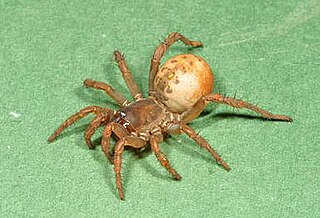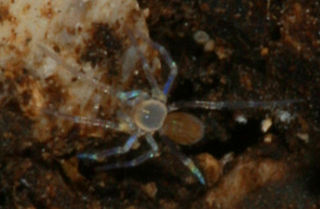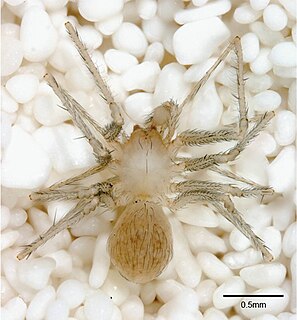
The Mesothelae are a suborder of spiders that includes a single extant family, Liphistiidae, and a number of extinct families. This suborder is thought to form the sister group to all other living spiders, and to retain ancestral characters, such as a segmented abdomen with spinnerets in the middle and two pairs of book lungs. Members of Liphistiidae are medium to large spiders with eight eyes grouped on a tubercle. They are found only in China, Japan, and southeast Asia. The oldest known Mesothelae spiders are known from the Carboniferous, over 300 million years ago.

The Tooth Cave spider, formerly Neoleptoneta myopica, now Tayshaneta myopica, is a 1.6 mm long spider in the family Leptonetidae. It is endemic to limestone caves near Austin, Texas in the United States and is considered an endangered species.

Leptonetidae is a relatively primitive family of spiders first described by Eugène Simon in 1890. It is made up of tiny haplogyne spiders, meaning they lack the hardened external female genitalia. Their six eyes are arranged in a semicircle of four in front and two behind. Many live in caves or in leaf litter around the Mediterranean, and in Eurasia, Japan and southern North America.

Austrochilidae is a small spider family with nine species in two genera. Austrochilus and Thaida are endemic to the Andean forest of central and southern Chile and adjacent Argentina.
Neoleptoneta is a genus of North American leptonetids that was first described by Paolo Marcello Brignoli in 1972.

The Leptonetoidea are a superfamily of haplogyne araneomorph spiders with three families. Phylogenetic studies have provided weak support for the relationship among the families. The placement of one of the families within the Haplogynae has been questioned.

The Haplogynae or haplogynes are one of the two main groups into which araneomorph spiders have traditionally been divided, the other being the Entelegynae. Morphological phylogenetic studies suggested that the Haplogynae formed a clade; more recent molecular phylogenetic studies refute this, although many of the ecribellate haplogynes do appear to form a clade, Synspermiata.

The Entelegynae or entelegynes are a subgroup of araneomorph spiders, the largest of the two main groups into which the araneomorphs were traditionally divided. Females have a genital plate (epigynum) and a "flow through" fertilization system; males have complex palpal bulbs. Molecular phylogenetic studies have supported the monophyly of Entelegynae.

Atypoidea is a clade of mygalomorph spiders, one of the two main groups into which the mygalomorphs are divided. It has been treated at the rank of superfamily. It contains five families of spiders:
Appaleptoneta is a genus of North American Leptonetids that was first described by Norman I. Platnick in 1986.
Archoleptoneta is a genus of North American spiders that was first described by Carl Eduard Adolph Gerstaecker in 1974. As of May 2019 it contains only two species, both found in the United States: A. gertschi and A. schusteri.
Calileptoneta is a genus of North American Leptonetids that was first described by Norman I. Platnick in 1986.
Chisoneta is a genus of North American Leptonetids that was first described by J. Ledford in 2011.
Montanineta is a monotypic genus of North American leptonetid spiders containing the single species, Montanineta sandra. It was first described by J. Ledford in 2011, and has only been found in the United States.
Ozarkia is a genus of North American leptonetids that was first described by J. Ledford in 2011.

Tayshaneta is a genus of North American leptonetids that was first described by J. Ledford in 2011.

Apollophanes is a genus of running crab spiders that was first described by Octavius Pickard-Cambridge in 1898.
Archoleptonetidae is a family of spiders in the order Araneae. There are two genera and about eight described species in Archoleptonetidae. They are known from the western USA, southern Mexico, Guatemala, and Panama. This family was formerly a subfamily of Leptonetidae.
Archoleptoneta gertschi is a species of spider. It is known in a small area of California.








